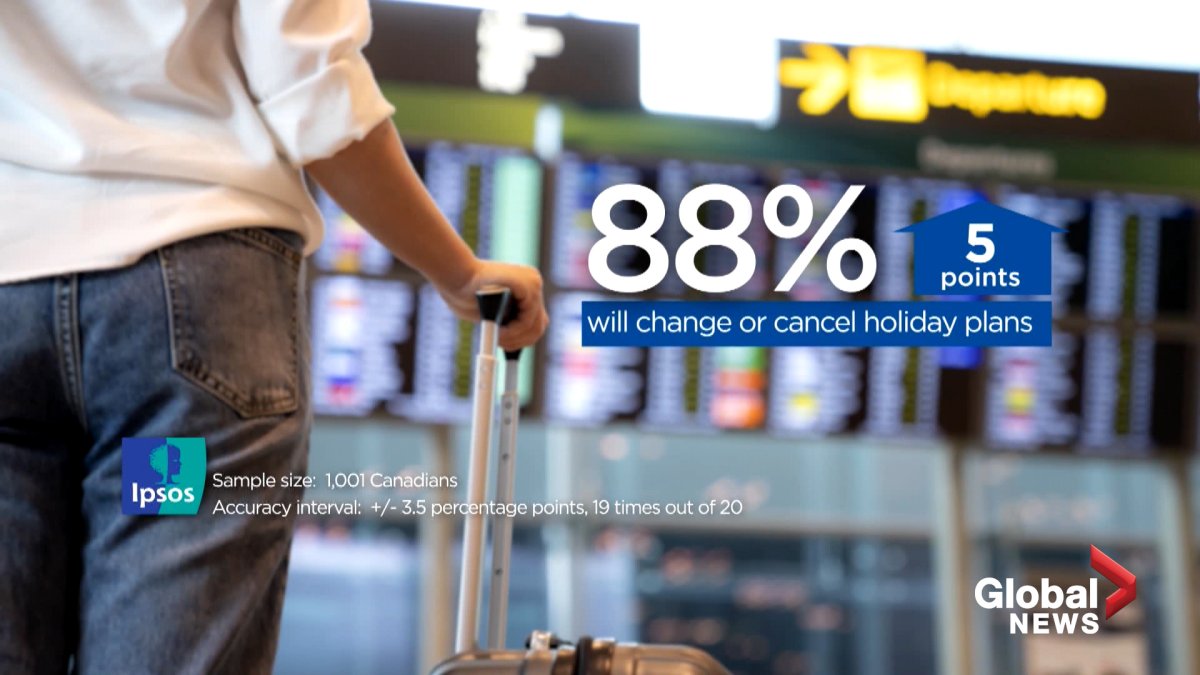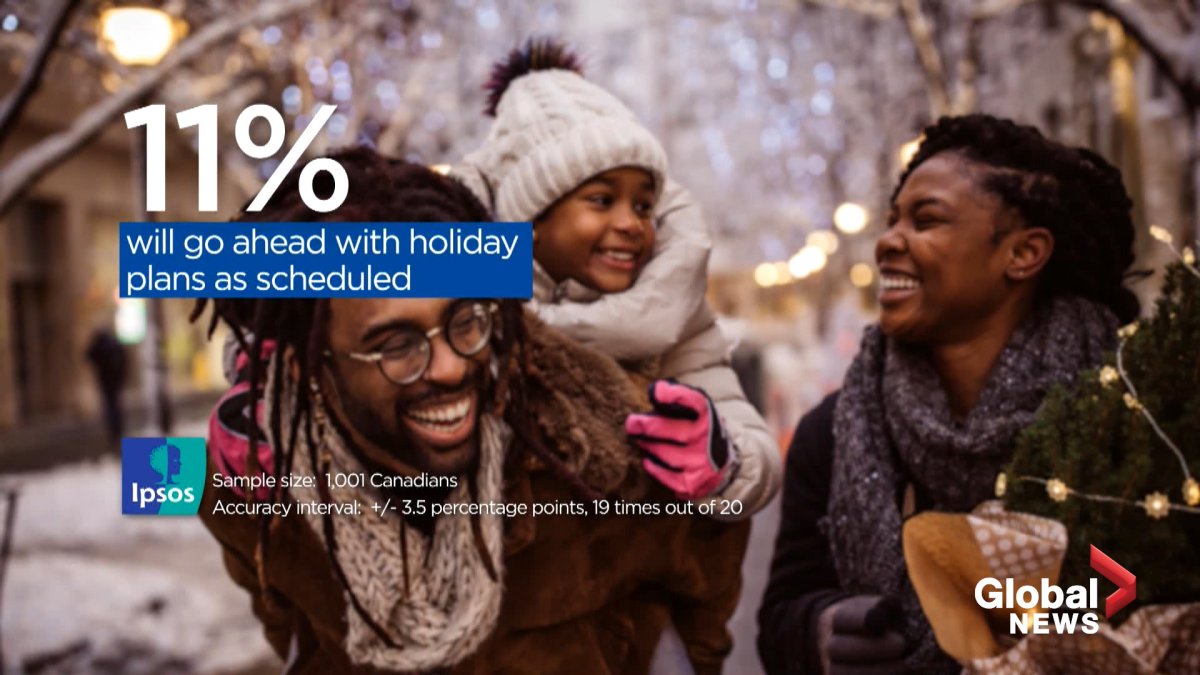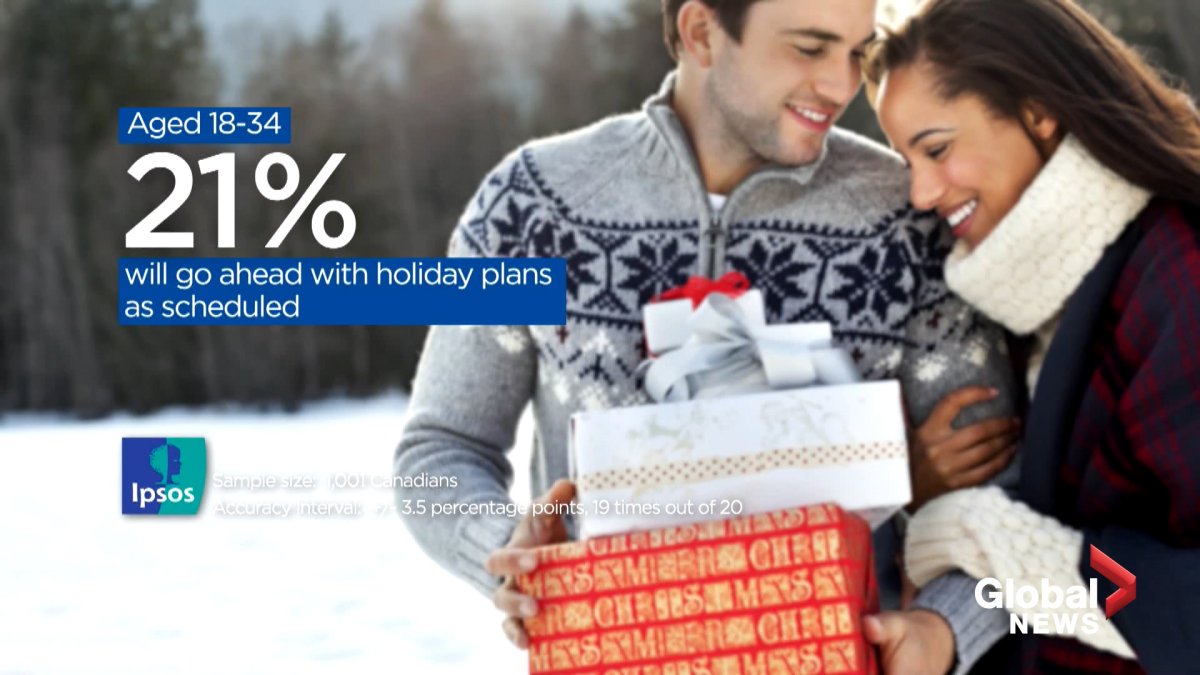Canadians are preparing to make some big changes to their holiday plans this year, with a new poll showing that nine in 10 are planning to either modify or cancel this season’s events amid the country’s rising surge of new coronavirus cases.

According to new polling from Ipsos, over five in 10 Canadians said they would either reduce their contacts or socially distance more during the holidays, while a whole 34 per cent said they would be cancelling their holiday plans altogether.
The sentiment is similar for Canadians planning for New Year’s Eve, as well, with only one in 10 saying they would go ahead with their Dec. 31 plans as normal.
Darrell Bricker, Ipsos CEO of Public Affairs, said that as Canadians plan to stop or cancel their holiday events this year, Christmas 2020 was shaping up to be like “no Christmas we’ve ever had before.”
“Well, it looks like Christmas and New Year’s 2020 is going to be The Grinch’s dream and it looks like everybody’s basically cancelling what they were doing and if not cancelling what they’re doing, probably thinking about modifying how they celebrate the holiday season,” said Bricker.
The polling comes amid a record-breaking second wave of COVID-19 that has sent many of the country’s cities and provinces into lockdown. Daily reported case numbers have shattered national records since the start of November, with newly identified infections peaking at 5,963 Friday.
On Sunday, Canada broke yet another grim threshold as virus-related deaths surpassed 12,000.
Bricker said that Canadians were modifying their holiday plans much like the way they would modify what they would wear if they knew the weather forecast.

“That’s what’s happening with with the COVID crisis,” said Bricker. “People are modifying the way that they even dress, the way that they come into contact with people and they’re obviously modifying events which they get together — not just at Christmas, New Year’s, but even birthdays.”
According to the polling, whether or not Canadians were modifying plans also differed on where they were located, with those in Atlantic Canada being the least likely to not change their plans. Ontario, on the other hand, had the most respondents indicating they would either change or cancel, with about four in 10 Ontarians planning to pull the plug on their events.

COVID-19 case figures in Atlantic Canada remain relatively small in comparison to the hundreds of thousands tallied by non-Maritime provinces, with New Brunswick, Nova Scotia, P.E.I. and Newfoundland and Labrador cumulatively accounting for just 2,200 out of Canada’s 373,390 total cases.
Ontario also recently placed both its virus hotspots of Peel and Toronto into lockdown as virus cases continue to spike in the province. On Friday, the province saw a record number of cases reported, with 1,855 new COVID-19 infections.
“And as far as the lockdowns continue, you’re seeing that they’re not only modifying their public behaviour, they’re modifying the private behaviour — and that’s behaviour that involves their families and celebrations,” explained Bricker.
In terms of Canadians not following public health advice, over 10 per cent said they would be going ahead with their Christmas or holiday plans as scheduled despite any lockdowns or restrictions.
Bricker said that, even after taking into account Canada’s population and the poll’s age cutoff, the estimated 3 million-plus Canadians expected to not change their plans could cause some problems. Despite that, Bricker said that he was optimistic that the number was “only 10 per cent,” and that the vast majority of Canadians were still following the advice they’ve been given.
The poll also revealed an in interesting trend seen among the 18 to 34 age group, with that demographic most likely to not alter their holiday plans and celebrate both New Year’s Eve and a birthday as normal.
Bricker said that after having asked the perspectives of different population groups living through the pandemic, the group having both the hardest time following public health advice and feeling the most affected by the COVID-19 crisis was that of young people.
“Not only are they more likely to say that they’re still going to be trying to find a way to gather, but they’re also the ones that are reporting the highest mental health effects, the most difficult mental health effects as a result of being asked to not gather with their friends,” he said.
“So people who are, you know, going through these types of changes when it comes to school, they’re going through it in terms of their social lives, dating, everything else. It’s really having a very significant impact on their lives, and they’re frankly tired of what’s going on.”
The poll also found that Canadians had only changed slightly in their purchasing habits from the start of the pandemic.
According to the results, one-third of Canadians said they would be doing more online shopping now in comparison to when the first wave hit, while 53 per cent said they would be doing the same amount.
Bricker said the most interesting finding here was that it’s the older demographic of people, aged 35-54, that saw a boost in being more likely to or trying to shop online.
Lastly, the poll revealed that when it came to shopping local, only 17 per cent of Canadians said they would be ordering more from a local restaurant more than they did during the spring, while 23 per cent said they would be ordering less from a local place than they did during the virus’ first wave.

“Now, one thing that we’ve been hearing an awful lot about is that we should be shopping more with local businesses or we should be trying local restaurants and we should be ordering out more from them through the holiday season and what we’re finding is that actually that message isn’t really cutting through,” said Bricker.
“So there’s a lot of work to do on that front.”
METHODOLOGY: This Ipsos poll was conducted online of 1,001 Canadians over the age of 18 between Nov. 20 to Nov. 23, 2020. Quotas and weighting were employed to ensure that the sample’s composition reflects that of the Canadian population according to census parameters. The precision of Ipsos online polls is measured using a credibility interval. In this case, the poll is accurate to within ±3.5 percentage points, 19 times out of 20, had all Canadians aged 18 and over been polled. The credibility interval will be wider among subsets of the population. All sample surveys and polls may be subject to other sources of error including, but not limited to, coverage error and measurement error.








Comments